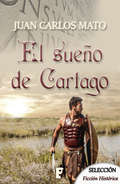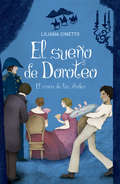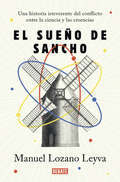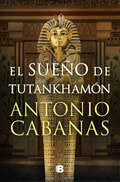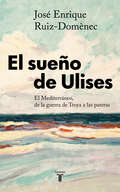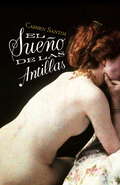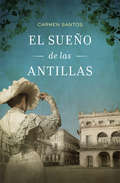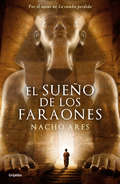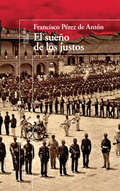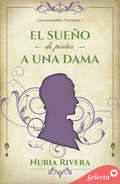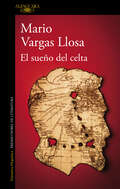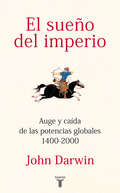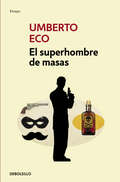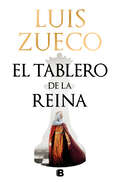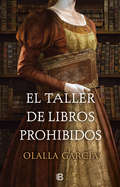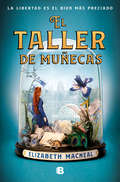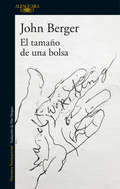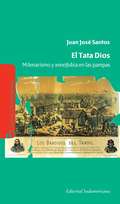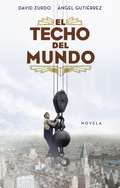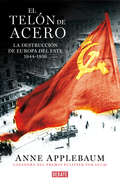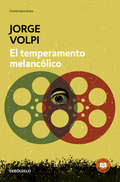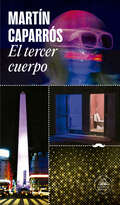- Table View
- List View
El sueño de Cartago (Bdb)
by Juan Carlos MatoDos pueblos enfrentados. Una venganza. El odio de un vencido general forjado al rojo vivo en el alma de sus hijos. Una nación orgullosa que no se deja conquistar. Asdrúbal Barca defiende su territorio en la península ibérica en confrontación con Cneo Cornelio Escipión al tiempo que los hermanos de ambos, Aníbal y Publio, miden sus fuerzas en la Galia Cisalpina. Mientras, el Senado romano y la Balanza cartaginesa se tambalean por sus propias luchas internas. En este escenario de muerte, corrupción, traición y ambiciones personales se mueven los distintos personajes que van encontrando el amor, la pérdida y el dolor a la vez que la historia nos sumerge en un viaje rumbo a la Segunda Guerra Púnica desde el interior de quienes la vivieron: Cartago y Roma.
El sueño de Doroteo
by Liliana CinettoUna novela llena de humor y aventura que, de la mano de un personaje adorable, nos ayuda a conocer la intimidad del valiente ejército, a saber cómo sucedieron algunas de las grandes batallas y cómo fue la enorme hazaña libertadora del Ejército de los Andes. En el caserón de la familia Ferrari se prepara un gran agasajo. Esa noche estarán presentes los miembros más ilustres de la sociedad mendocina. Y se ha confirmado una visita muy importante: asistirá el mismísimo gobernador de Cuyo, el general don José de San Martín, junto a su esposa, doña Remedios de Escalada. Todos trabajan para que esa noche no falte ningún detalle. Y de repente vuelve a pasar. Doroteo, el hijo de la negra Romualda, comete otra macana... Él es simpático, atento, de voz dulce y bien dispuesto, pero taaan distraído... Y taaan atolondrado... Sin embargo, cuando Doroteo se entera de que serán libres quienes se alisten en el ejército que cruzará los Andes, empieza a forjar su propio sueño. Pero no será nada fácil, porque además de alejarse de su madre y de Felisa, deberá superar el entrenamiento en El Plumerillo, ¡y dominar su propia torpeza!
El sueño de Sancho: Un historia irreverente del conflicto entre la ciencia y las creencias
by Manuel Lozano Leyva¿Ver para creer o creer para ver? Una irreverente historia del eterno conflicto entre la ciencia y las creencias. «Sancho, pues vos queréis que se os crea lo que habéis visto en el cielo, yo quiero que vos me creáis a mí lo que vi en la cueva de Montesinos; y no os digo más.» Manuel Lozano Leyva recurre a este pacto de fe entre don Quijote y Sancho Panza para dar comienzo a un análisis de la evolución en paralelo de los dos productos más sorprendentes del cerebro humano: la ciencia y las creencias. Con este objetivo en mente, el autor aborda los hitos históricos que han marcado esta compleja relación secular. Desde el inicio de los tiempos, las respuestas teológicas a los mayores interrogantes de la humanidad han conformado doctrinas con el poder de cohesionar las más diversas comunidades. Sin embargo, la progresiva aparición de teorías científicas para arrojar luz sobre dichas cuestiones desafiaría el dogma instaurado y llevaría al extremo el enfrentamiento entre ciencia y religión, técnica y creencias, racionalidad y fe. En El sueño de Sancho se desvela el origen, el desarrollo y, en muchos casos, la extinción de las respuestas que la humanidad ha ido construyendo. Creyentes o escépticos, esta irreverente historia del conflicto entre ciencia y fe no dejará indiferente.
El sueño de Sophia (Los colores de la belleza #Volumen 2)
by Corina BomannLa esperada continuación de la historia de Sophia, atrapada en la legendaria rivalidad entre dos reinas de la belleza: Helena Rubinstein y Elizabeth Arden. Cuando todo parecía perdido, una misteriosa carta ha despertado un rayo de esperanza en Sophia: el hijo que creía muerto aún puede estar vivo en París. Pero al llegar a la ciudad en busca de confirmación, Sophia choca con un muro implacable de silencio. Decide entonces aceptar la oferta de trabajo de Elizabeth Arden, la gran rival de su antigua jefa, Helena Rubinstein. Un ambiente lleno de glamour recibe a la joven química pero cuando madame Rubinstein vuelve inesperadamente a su vida, Sophia se encuentra atrapada en medio de una verdadera guerra entre las dos emperatrices del maquillaje. Su futuro, amor y felicidad vuelven a estar en juego... Una serie llena de encanto y glamour que ha enamorado a los lectores de Anne Jacobs, Lucinda Riley o Charlotte Link.
El sueño de Tutankhamón
by Antonio CabanasLa gran novela sobre Tutankhamón por el maestro del género del Antiguo Egipto. Un viaje fascinante al corazón del Antiguo Egipto y el reinado de Tutankhamón, el faraón más enigmático de la Historia. Tras el reinado déspota y caótico de su padre, el joven Tutankhamón trata de poner orden en un país dividido. El faraón es apenas un adolescente y la despiadada lucha por el poder le ha sumido en la más absoluta soledad, pero todo cambia cuando aparece en su vida un humilde pescador llamado Nehebkau, que posee el increíble don de atraer a las cobras y encantarlas con su sola presencia. Será así como comience la profunda amistad que marcará la vida de ambos y será el hilo conductor de esta historia que nos transporta a una época fascinante. Con el rigor y el ritmo propios de un gran maestro de la novela histórica, Antonio Cabanas nos sumerge en el convulso Egipto del siglo XIV a. C. Figuras como Akhenatón, Horemheb ola poderosa Nefertiti desfilan por las páginas de esta obra que también nos descubre las intrigas fraguadas a la sombra del faraón, los secretos guardados en las tumbas, cómo era la vida de quienes las construían y el alcance de las maldiciones de los dioses. Esta gran novela llega a los lectores coincidiendo con el aniversario del descubrimiento de la tumba de Tutankhamón en el Valle de los Reyes en 1922. Desde el mítico hallazgo del arqueólogo Howard Carter, el farón más famoso y al mismo tiempo más desconocido del Antiguo Egipto siempre ha despertado una enorme fascinación. Por fin, en las páginas de esta novela, Antonio Cabanas nos descubre al hombre oculto tras el gran enigma histórico.
El sueño de Ulises
by José Enrique Ruiz-DomènecUna iluminadora reflexión sobre el Mediterráneo como escenario de la historia y como idea del mundo. El Mediterráneo es un mar aparentemente plácido sobre el que a menudo se ciernen negros nubarrones, un lugar de encuentro y a la vez de conflicto, cuna de los mitos clásicos y de las grandes religiones monoteístas, escenario de algunas de las más deslumbrantes creaciones de la humanidad y campo de batalla de terribles guerras. Con extraordinaria amenidad, José Enrique Ruiz-Domènec construye un elegante retrato del mundo mediterráneo desde la Antigüedad clásica hasta nuestros días que integra ideas y acontecimientos, figuras históricas y literarias, intrigas políticas y pasiones humanas, obras de arte y libros de una biblioteca del conocimiento universal. De la muerte de Sócrates a Carlomagno, de Marco Polo a Napoleón y los sabios de Egipto, de Trieste a Israel, de la Barcelona olímpica a la guerra de los Balcanes, El sueño de Ulises es la gran obra de un maestro de la historiografía que, después de cuarenta años de estudio sobre el Mediterráneo y de diversos libros de éxito, presenta la síntesis definitiva de un crisol de civilizaciones que ha marcado el curso de la historia de forma indeleble a lo largo de tres mil años. Con una habilidad narrativa fascinante, el autor ofrece una iluminadora reflexión sobre la importancia del legado mediterráneo en la cultura mundial, desde la guerra de Troya, que inspiró la poesía épica de Homero, hasta las pateras, que llegan hoy a nuestras costas y constituyen la imagen de nuestras peores decisiones. Un libro de historia para viajar al pasado, entender el presente y pensar el futuro.
El sueño de las Antillas
by Carmen SantosEn la Habana del siglo XIX, una mujer decide tomar las riendas de su vida y forjar su propio destino. En 1858, cuando Valentina partió desde España hacia la colonia de Cuba en pasaje de tercera clase, tenía un joven marido a su lado y el corazón repleto de ilusiones. A su llegada a la isla, sin embargo, sus sueños se resquebrajan: su esposo ha muerto durante la agotadora travesía y el lugar, de pronto, se revela como un entorno hostil. Sólo Tomás Mendoza, un atractivo médico que viajaba en el mismo barco que ella, intenta ayudarla proponiéndole matrimonio. Pero Valentina le rechaza por orgullo, pues no está dispuesta a inspirar lástima, aunque eso signifique tener que vender su cuerpo en un refinado prostíbulo caribeño. Lo que no sospecha es que hay hombres que no se conforman con unas horas de lujuria comprada y que algunos, como el rico y apuesto Leopoldo Bazán, bajo sus caballerosas formas esconden la más abyecta crueldad. Con el pulso firme y sagaz de los grandes novelistas, Carmen Santos ha tejido una historia inolvidable que tiene mucho de las grandes sagas. De las calles habaneras al prostíbulo y de allí a los fastuosos salones de la alta sociedad isleña, enriquecida hasta lo inimaginable con el cultivo de la caña de azúcar, El sueño de las Antillas nos cuenta la historia de una mujer fuerte, valiente y carismática que, en una época de intrigas políticas por la independencia de Cuba y por la abolición de la esclavitud, se debate entre la ambición, la venganza y el amor verdadero.
El sueño de las Antillas
by Carmen SantosLa historia de una mujer fuerte, valiente y carismática que, en una época de intrigas políticas, se debate entre la ambición, la venganza y el amor verdadero 1858. Cuando Valentina zarpó desde España hacia la colonia de Cuba en pasaje de tercera clase, tenía un joven marido a su lado y el corazón repleto de ilusiones. A su llegada a la isla, sin embargo, sus sueños se resquebrajan: su esposo ha muerto durante la agotadora travesía y el lugar, de pronto, se revela como un entorno hostil. Sólo Tomás Mendoza, un atractivo médico que viajaba en el mismo barco que ella, intenta ayudarla proponiéndole matrimonio. Pero Valentina le rechaza por orgullo, pues no está dispuesta a inspirar lástima, aunque eso signifique tener que vender su cuerpo en un refinado prostíbulo caribeño. Lo que no sospecha es que hay hombres que no se conforman con unas horas de lujuria comprada y que algunos, como el rico y apuesto Leopoldo Bazán, bajo sus caballerosas formas esconden la más abyecta crueldad. Con el pulso firme y sagaz de los grandes novelistas, Carmen Santos ha tejido una historia inolvidable que tiene mucho de las grandes sagas. De las calles habaneras al prostíbulo y de allí a los fastuosos salones de la alta sociedad isleña, enriquecida hasta lo inimaginable con el cultivo de la caña de azúcar, El sueño de las Antillas nos narra la historia de una mujer decidida a tomar las riendas de su vida y forjar su propio destino.
El sueño de los faraones
by Nacho AresNadie debe profanar el sueño de los faraones...El egiptólogo Émile Brugsch intenta averiguar la procedencia de algunos objetos valiosos que han aparecido en las tiendas de antigüedades de Luxor. Su instinto le dice que, detrás de esos objetos que se venden como recuerdos a los turistas, subyace una tupida red de traficantes que actúa sin el menor escrúpulo amparada por unas autoridades locales corruptas.Lo que tanto él como los ladrones de tumbas ignoran es que ese lugar que está siendo saqueado sin piedad también esconde la prueba de algo que sucedió muchos siglos atrás, cuando los faraones gobernaban Egipto: una terrible historia marcada por la codicia, la traición y la más cruel de las venganzas.Una aventura que recrea uno de los mayores descubrimientos arqueológicos del siglo XIX al tiempo que nos sumerge en las apasionantes intrigas cortesanas del antiguo Egipto.
El sueño de los justos
by Francisco Pérez de AntónEn 1871, una revolución divide en dos, pasado y presente, la historia de Guatemala. El orden colonial se derrumba, la modernidad se abre paso a sangre y fuego y, en medio de tan brutal convulsión, dos jóvenes, Clara Valdés y Néstor Espinosa, se ven arrastrados a una insospechada odisea que cambiará sus vidas para siempre.
El sueño de pintar a una dama (Los irresistibles Trevelyan #Volumen 3)
by Nuria Rivera¿Puede un cuadro despertar la pasión? Cuando Sebastian Trevelyan conoce a Violet Harris tiene el deseo irrefrenable de pintar su retrato, pero no puede hacerlo como desearía, como tampoco puede abrirle su corazón porque ella está a punto de casarse y debe dejarla marchar. El precio de esta renuncia será una obsesión que lucha por ocultar. La mañana que encuentra en Hyde Park a una niña que le pide que la dibuje, no sospecha que su mundo se va a tambalear. Nunca ha huido de una mujer, pero ese día lo hace al descubrir quien es la madre de la pequeña. Violet Aniston, baronesa viuda Pattison, regresa a Londres con su hija, en busca de una nueva vida. En los seis años que han transcurrido desde que se marchó ha vestido de luto la mayoría del tiempo y se ha sentido encerrada en una jaula de oro. Pero una fuerza interior la empuja a ser una nueva mujer. El encuentro durante un baile entre Sebastian y Violet despierta los anhelos reprimidos y las viejas obsesiones. Ya no son los jóvenes que fueron, ya nada puede frenar la pasión que sienten y la antigua propuesta de pintar su retrato se hace una realidad. Violet siente que el descarado e irresistible pintor, que la mira con los ojos entornados y le atraviesa el alma, le provoca ideas muy disparatadas. Tantas que no es dueña de sí misma. ¿Será ese deseo por pintarla un modo de liberar la obsesión que lo persigue o la forma que tiene de conquistarla?
El sueño del celta
by Mario Vargas LlosaAquí se cuenta la peripecia vital de un hombre de leyenda: el irlandés Roger Casement. Héroe y villano, traidor y libertario, moral e inmoral, su figura múltiple se apaga y renace tras su muerte. Una novela mayor del Premio Nobel de Literatura 2010 Casement fue uno de los primeros europeos en denunciar los horrores del colonialismo. De sus viajes al Congo Belga y a la Amazonía sudamericana quedaron dos informes memorables que conmocionaron a la sociedad de su tiempo. Estos dos viajes y lo que allí vio cambiarían a Casement para siempre, haciéndole emprender otra travesía, en este caso intelectual y cívica, tanto o más devastadora. La que lo llevó a enfrentarse a una Inglaterra a la que admiraba y a militar activamente en la causa del nacionalismo irlandés. También en la intimidad, Roger Casement fue un personaje múltiple: la publicación de fragmentos de unos diarios, de veracidad dudosa, en los últimos días de su vida, airearon unas escabrosas aventuras sexuales que le valieron el desprecio de muchos compatriotas. El sueño del celta (2010) describe una aventura existencial, en la que la oscuridad del alma humana aparece en su estado más puro y, por tanto, más enfangado. La crítica ha dicho...«El sueño del celta reúne algunas de las mejores virtudes del escritor y se integra, además, en la estela de motivos temáticos fundamentales reiterados a lo largo de su obra.»Ricardo Senabre, El Cultural «Vargas Llosa no tiene rival: en El sueño del celta la tarea de lectura y documentación previa es ingente, descomunal y titánica. Pero jamás abruma al lector. He aquí el primer mérito de esta novela: contar una historia como si todo fuera verdad escondiendo la mentira. El segundo mérito estriba en el dominio absoluto y constante del creador sobre su criatura. Ha escrito novelas más complejas técnicamente, pero la estructura de esta queda perfectamente encajada en lo que el novelista se ha propuesto... Con un dominio absoluto de la novela, que empieza en 1903 y acaba en una cárcel de Londres en 1916, demuestra por qué la Academia sueca lo premió con el Nobel.»Ricardo Baixeras, El Periódico «El sueño del celta dibuja, con los recursos de la ficción, los despiadados entresijos del poder y la fuerza de la individualidad... La novela avanza envolvente, a ritmo impecable, y nos sumerge en una crónica sobrecogedora del despotismo, con unos personajes tan enraizados en su doliente y contradictoria humanidad que hacen de esta novela un gran regalo literario.»C. Méndez, Expansión «Una novela que aspira a abarcar todo el inabarcable espacio de la vida de un hombre... Con esa manera de contar de Vargas Llosa que emboba, arrastra, hipnotiza y demuestra una vez más que, en efecto, la muerte lo encontrará escribiendo, pues, pasados los 70 años, escribir un prodigio como El sueño del celta mueve a envidia, admiración ilimitada y aplauso cerrado.»Francisco García Pérez, Información «De nuevo en el mundo ficticio de Vargas Llosa se revela en toda su crudeza la verdad de las mentiras. Innecesarios los elogios.»Juan A. Masoliver Ródenas, La Vanguardia (Cultura/s)
El sueño del imperio: Auge y caída de las potencias globales 1400-2000
by John DarwinUna extraordinaria historia de los imperios que nos recuerda lo que las potencias de hoy pueden aprender de las potencias de ayer. Los otomanos, los mogoles, los manchúes, los británicos, los soviéticos, los japoneses y los nazis... Todos los imperios que construyeron estaban destinados a ser eternos; y todos cayeron. Sin embargo, como John Darwin muestra en este magnífico libro, su ambición imperial creó el mundo que hoy conocemos. La muerte del gran emperador turco-mongol Tamerlán en 1405 supuso un punto de inflexión en la historia universal. Tamerlán fue el último de los «conquistadores del mundo» pertenecientes a la tradición de Atila y Gengis Kan. Nunca más volvería un solo hombre a unir Eurasia bajo su dominio. Y no habían pasado ni cincuenta años de su desaparición cuando los Estados de Occidente comenzaron a explorar las rutas navales que habrían de convertirse en las arterias de los grandes imperios marítimos. Esta es la historia de lo que ocurrió a partir de ese momento. Basándose en un poderoso ejercicio de historia comparada, John Darwin ofrece una innovadora mirada a la historia global, cuestionando las visiones eurocéntricas de nuestro pasado colectivo. Desde el ascenso y declive de las potencias europeas hasta la presencia colonial cada vez mayor de Estados Unidos y el resurgimiento de China y la India como poderes económicos globales, este libro brinda una perspectiva fascinante sobre el pasado, presente y futuro de los imperios. La crítica ha dicho...«Después de leer esta obra maestra, una cosa queda clara. El mundo aún no ha visto el último imperio».Literary Review «Una obra maestra [...] de una amplitud, una originalidad y una clarividencia impresionantes [...] ofrece perspectivas nuevas y provocadoras sobre la historia del mundo en los últimos seis siglos».Daily Telegraph «Fascinante... si este libro llegara a las manos adecuadas, a lo mejor también serviría para hacer del mundo un lugar menos peligroso».Sunday Telegraph «Maravillosamente esclarecedor... una percepción asombrosa de la historia global».Independent «Ambicioso, monumental y convincente».The Guardian «Genial... refuta el mito de que el auge de Occidente fue inevitable».BBC History Magazine
El superhombre de masas: Retórica E Ideología En La Novela Popular (Ensayo Ser. #Vol. 237)
by Umberto EcoUn análisis exhaustivo de los personajes que aparecen en las novelas. «Creo que se puede afirmar que la pretendida superhumanidad de Nietzsche tiene por origen y modelo doctrinal no a Zaratustra, sino al conde de Montecristo de Dumas.» Eco parte de esta afirmación de Gramsci para estudiar a los superhombres de las novelas populares, de Rocambole a Montecristo, de Arsène Lupin a James Bond, de Tarzán a Superman, sin olvidar a Rodolphe de Gerolstein, el príncipe de Los misterios de París. ¿Por qué y cómo se leen las novelas folletinescas? ¿Qué mecanismos entran en juego en su estructura narrativa? ¿Cómo funciona la ideología de la consolación (el héroe consuela al lector de no ser un superhombre)? Estas son algunas de las preguntas que se plantea Umberto Eco en esta recopilación de ensayos magistrales. La crítica ha dicho... «No es solo un punto de referencia imprescindible a la hora de enfrentarse al vasto mundode la literatura popular, es también una delicia por su chispeante estilo.»Joaquín Marco, ABC «Uno de los pensadores más influyentes de nuestro tiempo.»Los Angeles Times
El tablero de la reina
by Luis ZuecoPARA CONQUISTAR LA CORONA, HAY QUE CAMBIAR LAS REGLAS DEL JUEGO.Un thriller histórico que nos descubre los orígenes del ajedrez moderno y las intrigas de la Corte de Isabel la Católica.Más de 250.000 lectores esperan la nueva novela de Luis Zueco. «Luis Zueco está en el Olimpo de la novela histórica española». 20 minutosLuis Zueco,autor de El cirujano de almas y El mercader de libros, firma su novela más ambiciosa, llena de emoción e intriga, y nos sumerge en la Corte de Isabel I de Castilla, cuando la reina, tanto en el juego como en la Historia, se convirtió por primera vez en la figura más poderosa.Año 1468. Castilla se encuentra en un momento crucial de su historia. Alfonso de Trastámara ha muerto en sospechosas circunstancias y Enrique IV se alza como rey obligando a su hermanastra Isabel, la única que podría oponerse a sus planes, a firmar la paz. Ella acepta, pues está destinada a convertirse en Isabel la Católica y sabe que las grandes partidas no se ganan en el primer movimiento.Mientras los asuntos de la Corte mantienen al reino en vilo, el misterioso asesinato de un noble une fortuitamente a Gadea, una joven apasionada del ajedrez que esconde un oscuro pasado, y a Ruy, un cronista amante de la Historia y los libros. La peligrosa carrera a contrarreloj de ambos para descubrir al culpable se entrelaza con las conspiraciones y las guerras de la Corte de Isabel, quien bajo su mandato supo moverse como una maestra en el tablero y transformó para siempre la figura de la reina en el ajedrez.
El taller de libros prohibidos
by Olalla GarcíaUn thriller histórico ambientado en el fascinante mundo del libro en el siglo XVI. Novela histórica y de intriga, El taller de libros prohibidos nos transporta a la época en la que imprimir, vender y leer libros podía llegar ser una actividad sumamente peligrosa. Alcalá de Henares, 1572. La joven librera Inés Ramírez acaba de quedar viuda y ha de ponerse al frente del negocio familiar. Pronto descubre que su esposo poseía la clave de acceso al único ejemplar de un libro prohibido, cuya desaparición había sido ordenada por el poder político y la Iglesia siglos atrás. Con la colaboración de Pierre Arbús, un oficial de imprenta francés, inicia la investigación. Tendrá que tratar con personajes de todo tipo: maestros impresores, eruditos, delincuentes, nobles de alta cuna. Y todo bajo la sombra omnipresente de la Inquisición, que vela por controlar el pensamiento y la palabra, y la estricta censura de Felipe II. La crítica ha dicho...«Olalla García escribe desde un profundo conocimiento. La palabra fluida y una trama absorbente se imponen con facilidad.»Historia National Geographic
El taller de libros prohibidos
by Olalla GarcíaUn thriller histórico ambientado en el fascinante mundo del libro en el siglo XVI. Novela histórica y de intriga, El taller de libros prohibidos nos transporta a la época en la que imprimir, vender y leer libros podía llegar ser una actividad sumamente peligrosa. Alcalá de Henares, 1572. La joven librera Inés Ramírez acaba de quedar viuda y ha de ponerse al frente del negocio familiar. Pronto descubre que su esposo poseía la clave de acceso al único ejemplar de un libro prohibido, cuya desaparición había sido ordenada por el poder político y la Iglesia siglos atrás. Con la colaboración de Pierre Arbús, un oficial de imprenta francés, inicia la investigación. Tendrá que tratar con personajes de todo tipo: maestros impresores, eruditos, delincuentes, nobles de alta cuna. Y todo bajo la sombra omnipresente de la Inquisición, que vela por controlar el pensamiento y la palabra, y la estricta censura de Felipe II. La crítica ha dicho...«Olalla García escribe desde un profundo conocimiento. La palabra fluida y una trama absorbente se imponen con facilidad.»Historia National Geographic
El taller de muñecas
by Elizabeth MacnealLa embriagadora historia de una joven que aspira a convertirse en artista y del hombre que, obsesionado con ella, amenaza con destruir su mundo para siempre. Londres, 1850. La hermosa Iris trabaja, junto a su hermana, como aprendiz en el famoso taller de muñecas de la déspota señora Salter, pero su pasión es el arte. Cuando el pintor Louis Frost le pide que pose para él como modelo, ante ella se abre un mundo nuevo en el que, quizás, consiga su sueño de convertirse también en pintora. Sin embargo, su destino se truncará cuando Silas, un solitario taxidermista y coleccionista de curiosidades morbosas que está en contacto con el mundo artístico londinense, descubre la existencia de Iris durante la inauguración de la Gran Exposición Universal de Londres. La obsesión de Silas por Iris irá creciendo y tornándose cada vez más oscura, hasta que solo aspire a convertirle en la pieza estrella de su colección. La crítica ha dicho:«Una sobresaliente novela histórica, llena de vida, color e inteligencia.»Sunday Times «Vívida, cautivadora, absorbente.»Evening Standard «Magnífica, nos ofrece un repertorio de personajes extraordinario e inolvidable. Una historia única, evocativa y de irrefrenable lectura donde la tensión va creciendo hasta un clímax que te deja sin aliento.»Daily Express «Una historia penetrante, aterradora y maravillosamente evocativa sobre el amor y la obsesión.»Paula Hawkins, autora de La chica del tren
El tamaño de una bolsa
by John Berger«Nunca he escrito un libro con mayor sensación de urgencia.» Alfaguara recupera esta joya del ganador del Premio Booker John Berger, uno de los autores fundamentales de la literatura contemporánea. Así define el gran John Berger El tamaño de una bolsa, una de sus obras más lúcidas y conmovedoras, hoy más pertinente que nunca: «La bolsa en cuestión es una pequeña bolsa de resistentes. Una bolsa se forma cuando dos o más personas se ponen de acuerdo y se unen. Se unen para resistir contra un nuevo orden económico mundial que no puede ser más inhumano. Nos reunimos tú --el lector--, yo y todos aquellos de quienes se habla en los ensayos que contiene este libro: Rembrandt, los pintores de las cuevas rupestres, un campesino rumano, los antiguos egipcios, un experto en la soledad de ciertas habitaciones de hotel, unos perros en la media luz del crepúsculo, un locutor de radio. Y este intercambio refuerza inesperadamente nuestra convicción de que lo que está sucediendo hoy en el mundo es perverso y que las explicaciones que se nos suelen ofrecer al respecto son un montón de mentiras. Nunca he escrito un libro con mayor sensación de urgencia». En la cubierta de esta edición se reproduce un dibujo inédito que el propio Berger regaló a su traductor al alemán Hans Jürgen Balmes: tan personal, único y expresionista como cada página de este libro excepcional. Reseñas:«Una de las voces esenciales para comprender el estado de nuestra sociedad [...]. Combina a la perfección compromiso y reflexión.»El Confidencial «Un autor esencial. [...] Una mirada humanista, rebelde y serena al mismo tiempo, la de un renacentista.»Pedro Antonio Curto, El Comercio «Fue la voz de los frágiles, residuos del mundo moderno a los que su obra otorgó dignidad de reyes.»Javier Rodríguez Marcos, El País «Su obra parece labrada con una precisión de relojero, y una intimidad que podría confundirse con ternura.»The New York Times Book Review «Desde D. H. Lawrence no ha habido un escritor como Berger, capaz de ofrecer al mundo tal atención sobre los problemas humanos más disímiles, con una sensualidad que no renuncia a los imperativos de la conciencia y la responsabilidad.»Susan Sontag «Fue el Leonard Cohen de otra clase de rotunda melancolía: la de la tristeza (social, íntima) que provoca el auténtico saber en mitad de la sociedad capitalista de fauces abiertas y hambre incansable.»Diego Medrano, El Comercio «Los libros de Berger poseen la peculiar cualidad de parecer libros solo por azar. Hechos de palabras, las portan, sin embargo, con indulgencia, casi a regañadientes, como si igual pudieran estar hechos de lienzo y pintura o, aún mejor, de polvo y paja, barro y hueso.»Herald Tribune «Un faro de luztenue pero inagotable, constante, esperanzada.»Àlex Susana, Ara
El tango de la Guardia Vieja
by Arturo Pérez-ReverteHay personajes que te miran una vez y se quedan para siempre en tu vida. El tango de la Guardia Vieja, la nueva novela de Arturo Pérez-Reverte. Incluye además el cuaderno de bitácora de esta novela. La trepidante aventura de Max Costa y Mecha Inzunza les lleva a recorrer tres escenarios distintos del convulso siglo XX: pasarán en 1928 por Buenos Aires gracias a una extraña apuesta entre dos músicos, en Niza se verán envueltos una trama de espionaje durante los años de la Guerra Civil española y los primeros vientos de la segunda Guerra Mundial, para terminar en Sorrento, en los años sesenta, embarcados en una inquietante partida de ajedrez. El tango de la Guardia Vieja narra con pulso admirable una turbia y apasionada historia de amor, traiciones e intrigas, que se prolonga durante cuatro décadas a través de un siglo convulso y fascinante, bajo la luz crepuscular de una época que se extingue. En esta edición se incluye La construcción de una novela: El tango de la Guardia Vieja. Desde el inicio del proceso de escritura de El tango de la Guardia Vieja, Arturo Pérez-Reverte llevó una especie de cuaderno de bitácora de esta novela. A modo de making off, el autor registró algunas características de los personajes principales, las localizaciones en las que se desarrollaba la historia e incluso dio detalles sobre la resolución de problemas estilísticos o técnicos. Estos apuntes, varios de ellos recopilados en este libro, constituyen sin duda un valiosísimo material para la mayoría de los lectores o cualquier aspirante a escritor. Reseñas: «Arturo Pérez-Reverte cambia de registro, aunque sin salir de su mundo personal, y escribe una gran historia de amor. [...] La novela es también un amplio y documentadísimo fresco de la historia de una Europa desvanecida, la de los años veinte, treinta y sesenta. [...] Junto al amor y los sentimientos, unas páginas de sorprendente erotismo con una fuerte carga sexual. Y también grandes dosis perezrevertianas de aventura.»El País «La mejor novela de su autor.»Sergio Vila-Sanjuán, La Vanguardia «Asombroso compendio de amor y aventuras... Épica de los cuerpos y belleza entre las sábanas...»Jacinto Antón, Babelia «Eros, vida, deseo y aventura, todo ello contado por Arturo Pérez-Reverte de la mejor forma posible.»Enrique Turpin, La Vanguardia «Arturo Pérez-Reverte ha utilizado con genio, como un seductor deslumbrante, la iconografía cinematográfica, canónica, del héroe y la heroína, dos bellezas.»Justo Navarro, Babelia «Una novela de madurez, redonda, en la que se han reunido las mejores cualidades del autor, con una historia narrada sin desfallecimientos, siempre en tensión.»Angel Basanta, El Cultural Cita del libro:«Una pareja de jóvenes apuestos, acuciados por pasiones urgentes como la vida, se mira a los ojos al bailar un tango aún no escrito, en el salón silencioso y desierto de un transatlántico que navega en la noche. Trazando sin saberlo, al moverse abrazados, la rúbrica de un mundo irreal cuyas luces fatigadas empiezan a apagarse para siempre.» La crítica ha dicho...«Arturo Pérez-Reverte cambia de registro, aunque sin salir de su mundo personal, y escribe una gran historia de amor. [...] La novela es también un amplio y documentadísimo fresco de la historia de una Europa desvanecida, la de los años veinte, treinta y sesenta. [...] Junto al amor y los sentimientos, unas páginas de sorprendente erotismo con una fuerte carga sexual. Y también grandes dosis perezrevertianas de aventura.»El País «La mejor novela de su autor.»Sergio Vila-Sanjuán, La
El tata Dios: Milenarismo y xenofobia en las pampas
by Juan José SantosDe la colección Nudos de la Historia Argentina dirigida por JorgeGelman, un relato esclarecedor sobre el oscuro episodio del asesinato de36 inmigrantes en Tandil, en 1872, por motivos de xenofobia y fanatismoreligioso. El 1° de enero de 1872 medio centenar de «gauchos» asaltaron el pueblode Tandil a los gritos de «¡Viva la religión! ¡Mueran gringos ymasones!» Antes de ser aprehendidos por las fuerzas del orden, acabaroncon la vida de treinta y seis inmigrantes, de ambos sexos, incluidosniños y criaturas de pocos meses. Ante la Justicia, dirían más tarde queactuaron mandados por un curandero, a quien reconocían como Tata Dios ySalvador de la Humanidad, que les había anunciado el inminente fin delos tiempos y la tarea que Dios tenía reservada para ellos: elexterminio de los extranjeros y masones.La investigación intenta abordar este singular episodio de violenciaxenófoba en el marco del proceso de modernización que atravesaba lasociedad bonaerense. Se hace hincapié en las tensiones que introdujo unproyecto civilizador que consideraba a la inmigración europea como unagente fundamental en la transformación del «desierto» y la construcciónde una nación moderna.Para la colección Nudos de la Historia Argentina hemos pedido ahistoriadores de primer nivel que escriban libros sólidos pero a la vezatractivos, susceptibles de ser leídos y disfrutados por personasinteresadas en la historia, aunque carezcan de una formaciónuniversitaria en la disciplina. Esperamos estar a la altura del desafío.
El techo del mundo
by Ángel Gutiérrez David ZurdoEn 1929, el crack de la bolsa de Nueva York siembra en todo el mundo el caos y el desconcierto. En medio de la desesperación y la pobreza, tres hermanos luchan por salir adelante a la sombra de la construcción del edificio más alto del mundo: el Empire State.Criados en una granja de la América profunda, Tom, Jay y Beth son tres hermanos cuyo futuro cambia drásticamente al estallar la Primera Guerra Mundial. Con sus sueños rotos, las vidas de los chicos toman caminos diferentes hasta confluir de nuevo en 1929 cuando se inicia la construcción de «el techo del mundo», el edificio más alto levantado hasta ese momento. Moviéndose en escenarios como los despachos de Wall Street, las bambalinas de Broadway, los callejones de Brooklyn o el inframundo del hampa, entrelazarán sus destinos con los de otros inolvidables personajes para formar un apasionante fresco de una ciudad, Nueva York, en unos años en los que comenzó a cambiar su historia. Y aprenderán que, incluso en las condiciones más adversas, la esperanza de una vida mejor está a la vuelta de la esquina...
El telón de acero: La destrucción de Europa del Este 1944-1956
by Anne Applebaum«Una de las obras sobre la historia de Europa más interesantes pero rigurosas aparecidas en los últimos años»The Washington Post«Asombroso. Un libro que resucita un mundo oculto en gran medida para occidente, y que muchas de las personas que lo habitaron y lo padecieron, preferirían olvidar.»The New Yorker«Una historia épica pero también humana»The Wall Street Journal «Iluminador.»The Economist«La crónica, trágica e íntima de cómo se impuso el comunismo en Europa central.»David Frum, The Daily Beast, Favorite Books of 2012«Una historia perturbadora pero fascinante. Gracias a su precisión y a la lucidez de su análisis, Applebaum ha escrito una magistral obra sobre la brutalidad del dominio soviético.»Publishers Weekly, Best Book of 2012«Magistral . . . Su extraordinario conocimiento de la región, amplia perspectiva y sensibilidad para los detalles humanos hacen este libro tan atractivo como el anterior sobre el Gulag.»Daily Mail«Una auténtica obra maestra. Impresionante. El relato que hace Applebaum de esta asombrosa época tiene todo lo que debe tener un buen libro de historia: una investigación tan amplia como brillante, una narración Hermosa y sorprendente, una ambición enciclopédica, atención meticulosa a los detalles.»The Telegraph (UK)
El temperamento melancólico
by Jorge VolpiEl temperamento melancólico es una desenfrenada novela en la que Jorge Volpi ilustra las terribles consecuencias de fundir vida y arte, así como la inevitable melancolía que conlleva este peligroso acto. Cuando Carl Gustav Gruber descubre que tiene cáncer y que pronto morirá, decide filmar la que será su última película. El director alemán, afincado en México, elige a nueve actores inexpertos con el objetivo de explotar sus características psicológicas. En este microcosmos que retoma el Juicio Final como tema central del filme, y del libro de Volpi, los protagonistas conocerán hasta qué extremos son capaces de llegar.
El tercer cuerpo
by Martín CaparrósUn policial negro con el Bar Británico, el puente de Pompeya y la discoteca Palladium. En los baños de la mítica discoteca Palladium, Matías Jáuregui, el hijo algo verde de un rancio coronel, escucha una conversación susurrada sobre el escándalo del momento: la profanación de tres tumbas del cementerio de la Recoleta. Para tratar de justificar su membrete de «relaciones públicas», y hacer algún dinero, se le ocurre ofrecer sus servicios a Rafael López Aldabe, pariente de uno de esos cadáveres y, a la vez, turbio empresario al que su propio padre debe favores confusos. Con escenarios tan porteños como el Bar Británico, la Academia y el puente de Pompeya, El tercer cuerpo es una novela ribeteada de humor que, entre dealers, burros, merca y sexo raro, recorre tanto los círculos del hampa como los más tradicionales de una Buenos Aires altamente inflamable bajo la luz siempre incendiaria de los años ochenta. Críticas:«El tercer cuerpo de Caparrós puede considerarse como uno de los textos representativos del policial negro argentino».Martha Barboza, Universidad Nacional de Salta «Las ciudades inmensas y grises son las protagonistas de su obra, que destapan las desigualdades sociales de sus habitantes».Daiane Nora, El País«Su prosa y su mirada son un reactivo fuerte para almas sensibles o amigas de lo políticamente correcto».Leila Guerriero, El País «Caparrós provoca esa necesidad sonriente de subrayar, compartir en redes, reproducir sus trallazos"».Nadal Suau, El Cultural «Convence tanto como seduce».Edmundo Paz Soldán, La Tercera«Un perturbador sistemático, un sembrador de dudas».Francesca Lazzarato, Il Manifesto
